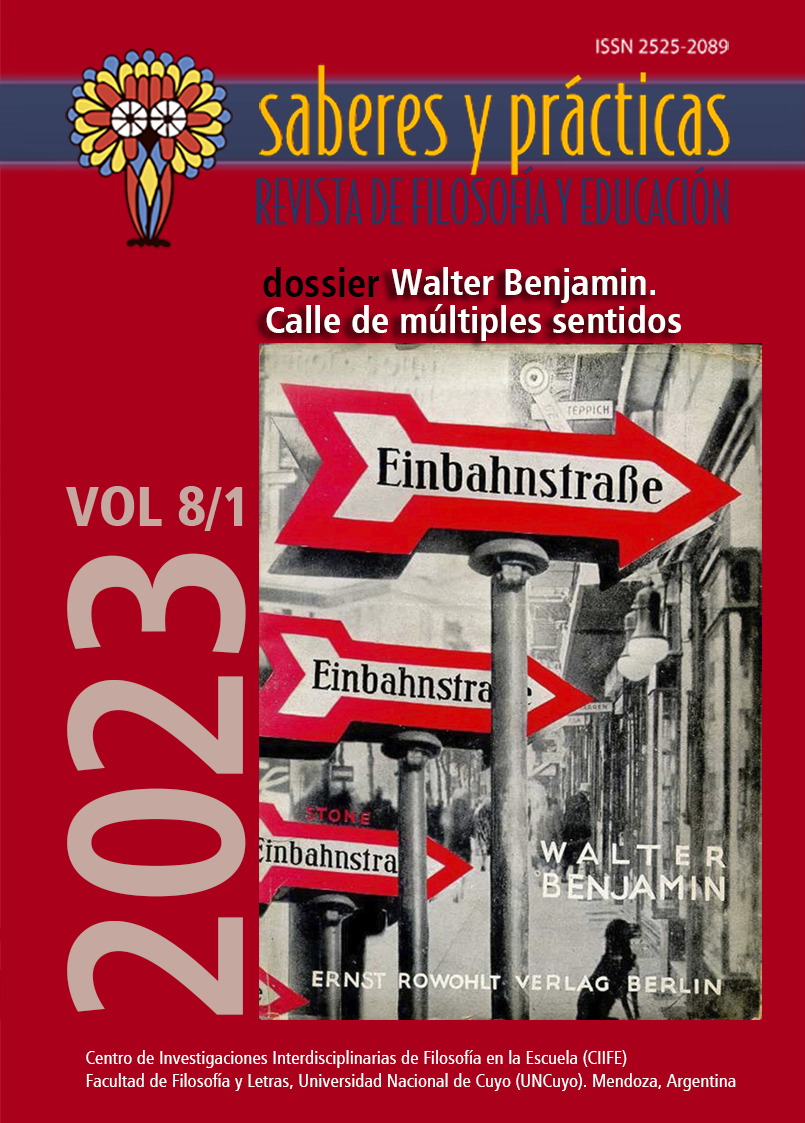On Some Motifs of Anthropological Materialism in Walter Benjamin
DOI:
https://doi.org/10.48162/rev.36.093Keywords:
Anthropological Materialism, Collective Body, Technique, Humanism, Non-HumanAbstract
This article offers a characterization of Walter Benjamin’s anthropological materialism, interpreting it as the theoretical-political program through which the author modulates his youthful metaphysical and anthropological interests in a profane, concrete and materialistic field, with the aim of endowing Marxism with new perspectives. This work presents anthropological materialism according to four basic theses: the retrospective inauguration of a tradition; the introduction of the idea of “collective body” as a political subject; the redefinition of the relationships between technique, nature and humanity; finally, the attempt to redraw the contours of human being from a kind of “more real” humanism.
Downloads
References
Adorno, T. W. y Benjamin, W. (1994). Briefwechsel 1928-1940. H. Lonitz (Ed.). Suhrkamp.
Barbisan, L. (2017). Eccentric bodies. From phenomenology to marxism. Walter Benjamin’s reflections on embodiment. Anthropology & Materialism. A Journal of Social Research, (1). https://doi.org/10.4000/am.803
Benjamin, W. (1972-1991). Gesammelte Schriften, 7 vols., R. Tiedemann y H. Schweppenhäuser (Eds.), con la colaboración de Th. W. Adorno y G. Scholem. Suhrkamp.
Berdet, M. (2013). Dans les champs magnétiques du matérialisme et de l’anthropologie. Anthropology & Materialism. A Journal of Social Research, (1). https://doi.org/10.4000/am.139
Berdet, M. (2014). Walter Benjamin et la passion dialectique. Armand Colin.
Berdet, M. y Ebke, T. (2014). Introduction. En Berdet, M. y Ebke, T. (Eds.), Matérialisme anthropologique et matérialisme de la rencontre. Arpenter notre présent avec Walter Benjamin et Louis Althusser (pp. 5-34). Xenomoi.
Borges, J. L. (1998). Kafka y sus precursores. En Otras inquisiciones (pp. 165-166). Alianza.
Braidotti, R. (2015). Lo posthumano, trad. Juan C. Gentile Vitale. Gedisa.
Bratu Hansen, M. (2004). Of Mice and Ducks. Benjamin and Adorno on Disney. En Delanty, G. (Ed.), Theodor W. Adorno, vol. 3 (pp. 249-276). SAGE Masters in Modern Social Thought series.
Brecht, B. (1977). Diario de trabajo, 1938-1941, trad. Nélida Mendilaharzu de Machain. Nueva Visión.
Depraz, N. (2004). Leib. En B. Cassin (Dir.), Vocabulaire européen des philosophies: Dictionnaire des intraduisibles (pp. 705-710). Éditions du Seuil/Dictionnaires Le Robert.
Di Pego, A. (2022). Hacia una política de lo no-humano (Unmensch): Walter Benjamin y Paul Scheerbart. Anthropology & Materialism. A Journal of Social Research, número especial II: “Walter Benjamin, materiales antropológicos”. https ://doi.org/10.4000/am.1685
Franklin, M. I. (2002). Reading Walter Benjamin and Donna Haraway in the age of digital reproduction. Information, Communication & Society, 5 (4), 591-624
Haraway, D. (1995). Ciencia, cyborgs y mujeres. La reinvención de la naturaleza, trad. Manuel Talens. Cátedra.
Hlebovich, L. (2022). Percepción y cuerpo en la filosofía de Walter Benjamin. Anthropology & Materialism. A Journal of Social Research, número especial II: “Walter Benjamin, materiales antropológicos”. https://doi.org/10.4000/am.1924
Ibarlucía, R. (2015). Iluminación profana y materialismo antropológico en Walter Benjamin. En Cohen, E. (Ed.), Walter Benjamin. Resistencias minúsculas (pp. 33-72). Godot.
Khatib, S. (2012). Walter Benjamins trans-materialistischer Materialismus. Ein Postskriptum zur Adorno-Benjamin-Debatte der 1930er Jahre. En Duttlinger, C., Morgan, B. y Phelan, A. (Eds.), Walter Benjamins Anthropologisches Denken (pp. 149-178). Rombach.
Latour, B. (2013). Investigación sobre los modos de existencia. Una antropología de los modernos, trad. Alcira Bixio. Paidós.
Lindner, B. (2009). Die ‚Heiterkeit des Kommunismus‘. Notizen zum Politischen bei Benjamin. Text + Kritik. Zeitschrift für Literatur, (31/32), 70-87.
López, N. y Pérez López, C. (2022) Walter Benjamin y lo antropológico. Hacia una distensión de lo humano y lo no-humano. Anthropology & Materialism. A Journal of Social Research, (número especial II). https://doi.org/10.4000/am.2095
Moore, J. (2016). The Rise of Cheap Nature. En J. Moore (Ed.) Anthropocene or Capitalocene? Nature, History, and the Crisis of Capitalism (pp. 78-115). Kairos-PM Press.
Steiner, U. (2000). Der wahre Politiker. Walter Benjamins Begriff des Politischen. Internationales Archiv für Sozialgeschichte der deutschen Literatur, 25(2), 48-92.
Steiner, U. (2006). Kapitalismus als Religion. En B. Lindner (Ed.), Benjamin Handbuch. Leben-Werk-Wirkung (pp. 167-174). Weimar: J.B. Metzler.
Weigel, S. (1997). Entstellte Ähnlichkeit. Walter Benjamins theoretische Schreibweise. Frankfurt am Main: Fischer.
Wohlfarth, I. (2002). Walter Benjamin and the Idea of a Technological Eros: A Tentative Reading of Zum Planetarium. En H. Geyer-Ryan, P. Koopman, y K. Yntema (Eds.), Benjamin Studies/Studien 1: Perception and Experience in Modernity. Amsterdam: Rodolpi.
Wohlfarth, I. (2010). Les noces de Physis et de Techne. Walter Benjamin et l’idée d’un matérialisme anthropologique. Cahiers Charles Fourier, (21). http://www.charlesfourier.fr/spip.php?article801
Wohlfarth, I. (2016). Spielraum. Jeu et enjeu de la «seconde technique» chez Walter Benjamin. Anthropology & Materialism. A Journal of Social Research, (3). https://doi.org/10.4000/am.633
Published
How to Cite
Issue
Section
License
Copyright (c) 2023 Nicolás López
This work is licensed under a Creative Commons Attribution-NonCommercial-ShareAlike 2.5 Argentina License.





















